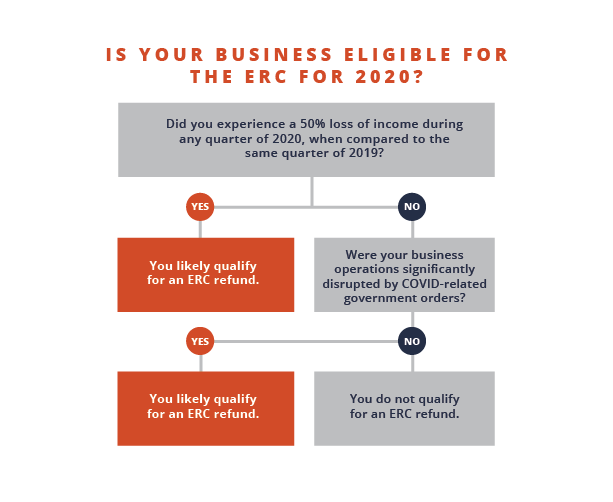How to Determine Your Employee Retention Credit Eligibility (ERC)
The Business Owner’s Guide to ERC Qualifications
By now, you’ve probably heard of the Employee Retention Credit (ERC) — the temporary payroll tax credit that rewards business owners who continued to pay employees during the pandemic. You’ve likely heard about the maximum ERC amount your business could recoup — up to $26K per employee. You may have even learned of executives in your network receiving large ERC refund checks from the Treasury Department.
You know you want your payroll tax money back.
But how do you know if your business is eligible for the Employee Retention Credit?
In this ERC Eligibility Guide, we will explain all the basic ERC Credit Qualifications and offer a step-by-step analysis to help you determine your business’ Employee Retention Credit eligibility.
Who Qualifies for the ERC Tax Credit?
Small businesses, startups, nonprofits , corporations, LLCs, and companies with less than 500 employees may be eligible for the ERC tax credit. US-based businesses across almost every industry may qualify.
In fact, the only businesses that may not qualify are companies that were able to work from home without modifying their operations. Still, those companies may be ERC-eligible if their income declined significantly.
What Are the Three Basic ERC Qualifications?
There are only three basic qualifications for the ERC tax credit. To qualify, a business must:
- Be based in the United States.
- Have employed less than 500 (or 100) full-time employees in 2019.
- Have either faced a significant disruption of typical business operations due to government mandate(s) OR endured a considerable loss of income during the pandemic.
If your business can meet these three basic ERC qualifications, it may be eligible for the credit. However, Employee Retention Credit eligibility becomes more complicated once you begin to determine which quarters you qualify for.
Your business doesn’t have to retain an employee throughout the entire pandemic, or even a complete year, to qualify. The ERC, and payroll taxes in general, are submitted every quarter, meaning that any wages paid during that quarter, up to the wage cap, can be declared as “eligible wages.”
The rules regarding who qualifies for ERC, and how much money a business can receive, are different for 2020 and 2021. The ERC credit qualifications for the 2021 tax year are more accessible than 2020, meaning that many businesses may qualify for a sizable ERC refund in 2021, but receive nothing for 2020.
As you can see, ERC eligibility becomes quite complicated rather quickly, which is why we recommend seeking professional assistance from a reputable tax credit provider.
Next, let’s analyze the nuances of 2020 vs 2021 ERC qualifications.

How Do You Qualify for the ERC for 2020?
To qualify for an ERC tax credit for 2020, your business must meet three qualifications:
- Your business is based in the USA.
- *Your business had 100 or fewer full-time, W-2 employees in 2019.
- For the third requirement, there are two different avenues to qualification:
EITHER
- You had to significantly modify business operations to comply with pandemic-related government orders, such as full/partial shutdown mandates, work-from-home orders, customer capacity limits, or social distancing orders.
OR
- Your business experienced a 50% loss of income from a single quarter of 2019 to the corresponding quarter of 2020. Your business does not have to qualify based on the total yearly income. If you only saw a 50% decrease in one quarter (compared to the same quarter in 2019), you can qualify for an ERC credit on employee wages paid during that quarter.
*If your company expanded above the 100-employee threshold in 2020 or beyond, you may still qualify based on your employee count from 2019. Part-time employees working less than an average of 130 hours per month do not count towards the 100-employee cap.

Congress Expands Employee Retention Credit Eligibility for 2021
The 2020 ERC proved effective, providing great benefits to individual businesses while stimulating the economy as a whole. As countless companies were drowning in pandemic shutdown orders and capacity limits, the ERC helped them remain afloat. The unexpected tax relief helped businesses retain their hardworking employees, keeping individuals out of the unemployment queue and in their valuable careers — where they can truly make a difference.
The resulting financial stimulus helped limit the pandemic’s damage to the American economy, and the federal government took notice. The U.S. Congress decided to double down on pandemic relief funds the next year, loosening ERC eligibility requirements and increasing refund values for 2021. Even if your company doesn’t meet the 2020 ERC qualifications, you may still qualify for the 2021 ERC, which is more inclusive.

How Do You Qualify for the ERC for 2021?
To qualify for an ERC tax credit for 2021, your business must meet three qualifications:
- Your business is based in the USA.
- *Your business had 500 or fewer full-time, W-2 employees in 2019.
- For the third requirement, there are two different avenues to qualification:
EITHER
- Your company had to modify business operations to comply with COVID-related government orders such as customer capacity limits, social distancing, full/partial shutdowns, reduced operating hours, staggered work crews, etc.
OR
- Your business experienced a 20% loss of income from a single quarter of 2019 to the corresponding quarter of 2021. Your business does not have to qualify based on the total yearly income. If you only saw a 20% decrease in one quarter (compared to the same quarter in 2019), you can qualify for an ERC refund on employee wages you paid during that quarter.
*If your company expanded above the 100-employee threshold in 2020 or beyond, you may still qualify based on your employee count from 2019. Part-time employees working less than an average of 130 hours per month do not count towards the 500-employee cap.
As you can see, ERC credit qualifications for 2021 are easier to meet than those for 2020. The 2021 ERC embraces relatively larger companies and businesses that suffered less severe losses. To discover if your business qualifies for the ERC for 2020 and 2021, contact Omega Accounting Solutions — a team of tax credit experts who work with integrity to ensure you receive every ERC refund check you’re entitled to.
Common Questions on ERC Tax Credit Eligibility Requirements
Can I claim the ERC if my business did not fully shut down?
Yes, you may still be able to claim the ERC if your business never fully shut down due to government mandates. In fact, the simplest route to ERC qualification is by a decline in annualized revenue of 50% for 2020 or 20% for 2021 when compared to your revenue for 2019.
If your business did not see a significant decline in income, you may also qualify by showing how pandemic-related government orders significantly impacted your ability to do business. Common reasons to qualify by this route include limits on customer or worker capacity, social distancing orders, work-from-home restrictions, production decreases, partial shutdowns, or limited operating hours.
Can I claim the ERC if my business did well during the pandemic?
Yes, you may still be able to claim the ERC if your business did well during the pandemic. In fact, you might qualify for the ERC even if your business grew during this time. You simply must prove that your company’s operations were nominally disrupted by pandemic-related government orders, such as indoor dining bans, capacity restrictions, social distancing mandates, work-from-home orders, or even supply chain disruptions.
You might think that only restaurants can qualify for the ERC by these means, but that is not the case. Construction companies can qualify by showing that social distancing orders significantly slowed their progress on a project. Even tech companies can qualify due to the shortage of semiconductors needed to build microchips.
If your business did well during the pandemic, that only eliminates one avenue of qualification for the ERC. You should inquire with a professional ERC provider to help determine if you qualify with an impact on your business operations.
Can you get ERC and PPP?
Yes, your business may be eligible to receive an ERC tax refund for 2021 despite receiving Paycheck Protection Program (PPP) funds in the past. The Employee Retention Credit was updated with a considerable expansion to the pool of eligible businesses. Many companies, and even tax professionals, were not made aware of this update, leaving thousands of payroll tax dollars in Treasury hands that can still be reclaimed today.
Can you receive ERC funds if you are self-employed?
Yes, you may be eligible to receive ERC funds if you are self-employed, but only for wages that you paid your employees during 2020 and 2021. Self-employed individuals cannot qualify wages paid to themselves. You must have had W-2 employees on your payroll to qualify for an ERC refund, and only those payroll expenses, including employer healthcare expenses, will qualify.
Are startups eligible for the Employee Retention Credit (ERC)?
Can you claim the ERC if your business started in 2021?
Yes, startup businesses may qualify for ERC through the Recovery Startup Credit and receive up to $50,000 per quarter for quarters three and four of 2021, or as much as $100,000. To be eligible for an ERC refund as a Recovery Startup Business, your company must meet three simple qualifications:
- Started business operations on or after February 15, 2020
- Employ one or more W-2 employees
- May not exceed $1 million in annualized revenue in its first year of operation
It’s actually easier to qualify for the ERC as a recovery startup business. As a startup, your company is not subject to the declined income or government order impact qualifications.
You may even be able to maximize your ERC refund amount by qualifying for both the original ERC and the Recovery Startup Credit. Because each quarter is treated independently by the IRS, you can claim the regular ERC for one quarter and then take the Recovery Startup Credit for another quarter. Startups can claim refunds for quarter four of 2021, so they alone can potentially qualify for ERC refunds throughout that entire year. Businesses established before February 15, 2020, can only claim ERC refunds through the first three quarters of 2021.

Does My Business Qualify for ERC?
Your US-based business may qualify for the ERC if it employed less than 500 employees in 2019 and EITHER faced a nominal disruption of typical operations due to a government order OR endured a considerable loss of income during the pandemic. However, it is difficult to determine which quarters of 2020 and 2021 your business is eligible for. It is even more difficult to calculate your ERC refund amount.
Employee Retention Credit eligibility is complicated. Don’t attempt to evaluate your ERC eligibility without expert help. Your business may qualify for an ERC refund in one quarter, and be ineligible in the next quarter. If you mistakenly claim the ERC when your business is ineligible, you will have to pay the money back — likely with penalties and interest. If you don’t claim the ERC when your business does qualify, you miss out on money that you were legally entitled to.
To be certain about your business’ ERC qualifications and ensure you calculate your credit correctly, you should contact a tax credit provider that specializes in payroll tax credits.
Choose the Trusted ERC Provider
Omega Accounting Solutions is a highly respected ERC provider that works with honesty and integrity. Omega performs a due diligence double-check to ensure your business truly meets official ERC qualifications. Should your business qualify, Omega’s ERC experts know precisely how to build claims that will stand up to an audit. Omega even provides you with documents to back up and substantiate your credit if your company is audited.
Business owners should play it safe when it comes to their Employee Retention Credit eligibility. Omega is the safest choice for ERC tax credit services. Contact Omega today to determine if your business qualifies.

The post How to Determine Your Employee Retention Credit Eligibility (ERC) appeared first on Omega Accounting Solutions.




Lead Types
ERC Exclusive Leads
ERC Inbound Calls
ERC Small Business Data
Our Company
Let’s Connect
Youtube
Contact Us
GetErcLeads.com is Powered By GROW with MKG


